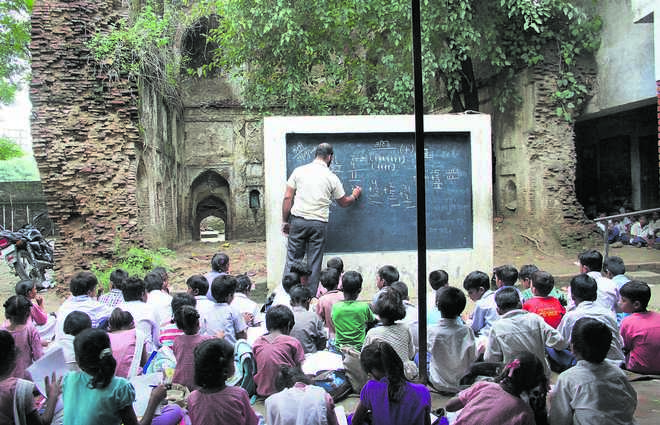
Government schools have failed to fulfil the responsibility for educating children. Neither educational nor pedagogical needs are met. Privatisation has become indispensable. A file photograph of a government school in Jalandhar. Tribune Photo: Sarabjit Singh
Brig MP Singh (retd)
Our Constitution has placed education on the Concurrent list, which has made central and state governments responsible for regulating all matters relating to all types of education, including technical, medical and vocational. However, education was not included in the list of Fundamental Rights. Resultantly neither the central nor the state governments made adequate arrangements for imparting even basic school education to its citizens. Illiteracy which was rampant before 1947, has continued to grow among the masses, particularly among the poor. Belatedly, the Right to Education Act, 2009,which has granted all children right to free and compulsory education, is expected to give relief from illiteracy.
The Act was evaded for nearly 60 years after Independence because the education of large masses could not be supported financially and a sufficient number of schools was not built. Infrastructural and pedagogical needs could not be met fully. Since governments failed to fulfil educational responsibilities towards its citizens, privatisation of education became indispensible. Many private schools were opened and (some even with indifferent standards) have grown in numbers. The quality of education in government-run schools has been questioned time and again and there is need for considerable improvement. Even the CBSE Class X results released recently have not shown as impressive performances as private schools. As per the 2009 Act, children in the age group between 6 and 14 are compulsorily required to attend school and the penalty for not sending children to school on parents was fixed at one year of imprisonment. But no such punishment appears to have been awarded.
To popularise attendance of school by children, schemes like mid-day meals, zero-fee and issuing of free books and stationery were introduced in some states. Even unaided private schools were required to admit a proportion of underprivileged children. These measures have shown some positive results, particularly in the case of education of girls. Even otherwise the number of school-attending children has increased and as per a government report (2013), nearly 22.9 crore children were enrolled in rural and urban schools, a figure that was higher as compared to 2009 — when the Right to Education Act was enforced.
However, eradication of illiteracy requires a lot to be done. A reason which may be responsible for poor performance can be that children attending school up to Class VIII cannot be detained. This provision needs review. The TSR Subramanian Committee, set up to draft the new education policy, has recommended detention after Class VI. In my view, even after the introduction of the system of continuous and comprehensive evaluation, examinations could not be dispensed with totally as education is not just about sending a child from Class I to Class VIII. Some achievements are necessary for continuing education later.
Privately run schools have a mixture of good and not-so-good schools. Public schools generally aim at the all-round development of a child. They are more expensive but are preferred schools. Lord Macaulay, who framed the education system in India in the 1830s, had built the school education system on the lines of the British system, where government-run schools and public schools coexisted. This became necessary as free education in government-run schools could not become affordable. The public schools in UK and Wales were "student selective and expensive fee-paying schools". These schools were granted full autonomy in case of fee and allied charges and were managed by the board of governors. They were kept outside government interference.
The first seven schools were: Eton School, Strawberry School, Westminster School, Charter House, Rugby House, Winchester School and Harrow School (Jawaharlal Nehru was educated here). These schools were associated with the ruling classes and they took the responsibility of educating the sons of officers and administrators of the British empire. On the lines of these public schools, Macaulay opened schools in the three Presidencies —namely, La Martiniere schools in Calcutta and Lucknow in 1836 and 1845, respectively, in the Bengal Presidency, Lawrence school Lovedale, Ooty, in the Madras Presidency and Elphinstone School in the Bombay Presidency. Soon after annexation of Punjab, the British opened Lawrence School Sanawar, in 1847 and Bishop Cotton School Shimla, in 1859. On the lines of the seven schools in UK, Aitchison College, Lahore and Rajkumar College, Rajkot were opened for the education of students from princely states. All public schools in UK as well as those in India were self-financed, they concentrated on the over-all development of students, for which they provided expensive facilities, such as equitation, swimming, co-curricular activities and in some cases organised “exchange programmes,” which made them much more expensive than government-run schools. Lately, many schools in the private sector have come up and fancy calling themselves public schools.
Needless to say, that some qualitative mandatory requirements must be laid down in case a school boasts of being a public school. As per the Human Resources Development Ministry, 29 per cent school children are studying in private schools, including public schools. Many more schools are required to accommodate nearly 6-7 crore non-schoolgoing children. Evidently, both public and private sector schools must go hand in hand to make the Sarva Shiksha Abhiyan a success.
The writer is a former Colonel Commandant of the Army Education Corps. and an adviser of Mukat Educational Trust, Patiala.



























